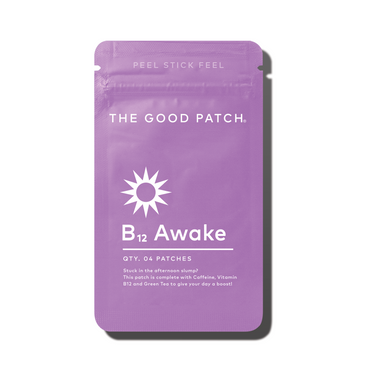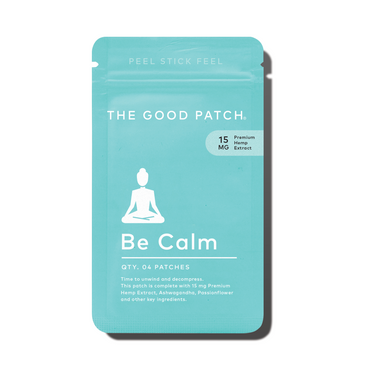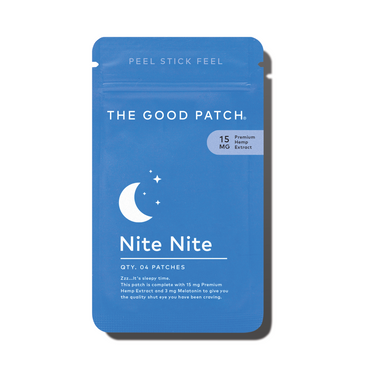Lying awake in your bed, doing your best to fall asleep, can be anywhere from mildly annoying to extremely frustrating. When you have a big day coming up, the last thing you want to do is roll over to check the clock, only to find you have to be up in four hours and you haven’t slept a wink.
At The Good Patch, we know having trouble getting a good night’s sleep is incredibly common, so we’re here to help you figure out a remedy!
If you are one of the almost 70% of Americans who report difficulty falling asleep at least once each week, you may need to evaluate various aspects of your life to find a fix. The key to better sleep is unique to each of us, but we can look at a few common culprits and ways to kick them out of our nightly routine.
Perhaps your sleep environment is simply the wrong temperature, or maybe the day's stress is nagging too much to get any shut-eye. Whatever the case may be, sleep is not only important for feeling good the next day. Not getting enough sleep can damage our physical and mental health in the long run.
If you wake up each morning exhausted from the night before, hopefully we can iron out the wrinkles in your sleep schedule! Read on for some causes and solutions for any sleep problems you may have.
Determine the “Why?”
Before you commit to that fancy new bamboo fiber sheet set, you might be better off determining what exactly is giving you trouble sleeping. Maybe your sheets are too scratchy or your pillow too soft, but there are myriad reasons worth considering when determining the source of your poor sleep quality.
Here are a few ways to discover reasons you might be struggling to doze off:

Check the Thermostat
Being too hot at night is proven to thwart sleepiness and keep you up at night.
Though it may seem chilly, setting the temperature in your bedroom to between 60 and 67 degrees Fahrenheit is ideal. Our body temperatures often increase at night, so we’ll discuss ways to stay cool later on.
Find Points of Stress
Climbing into bed overwhelmed or stressed could be the main reason you aren’t getting good sleep each night. Sleeplessness from stress is all too familiar — how can our bodies rest when our minds refuse to? The first step to quieting a racing mind is to figure out what is setting it off.
Acknowledge Recent or Soon-To-Come Life Changes
Whether they are good or bad, variations to our daily routine can also impact our nightly one. Don’t be surprised — anything from a wedding to a new work schedule can throw off your sleep pattern.
Beware of Blue Light
The light coming from your laptop, smartphone screen, and other electronic devices as you scroll through social media has several negative effects, including keeping you up at night. If Instagram or TikTok have become your pre-bedtime ritual, they may be at fault for your not-so-hot sleep habits.
Identify Health Concerns
It’s quite possible there is a larger underlying obstacle affecting your sleep. There is, in fact, a wide range of medical sleep disorders people experience all the time.
If you think your sleep struggle is medical (not just caused by the neighbor’s barking dog), please do not hesitate to contact a healthcare professional.
Analyze Your Dreams
When a nightmare wakes you in the middle of the night, it can be disconcerting and difficult to fall back asleep. Dreams tend to be linked to the real world, so analyzing bad ones could help you get to the core of the problem.
Practice visualization before bed to set your dreams up for success.
Sleep Tips for the Best Rest
We want you to find the perfect sleep aid for you, so we’ve compiled a list of our favorite options. Whether you benefit most from setting down your phone before bed or the Nite Nite patch becomes your best friend, slumber is a necessity we should all enjoy!

Stick to a Routine
Do your best to maintain a regular schedule of sleep throughout the week to mend your sleep cycle and get your body’s clock in tune. Sleeping in after a long week can be tempting, but it’s best to avoid switching up your sleep schedule.
Learn To Appreciate the Cold and Dark
While these two adjectives aren’t always the most inviting, they could be just the thing for your restless woes.
As you near bedtime, turn down the thermostat and draw the blinds. As mentioned before, the ideal sleep temperature is considered 60-67 degrees Fahrenheit. Invest in 100% cotton sheets and crack a window for a more refreshing sleep.
Keeping your sleeping space dark is equally important. Opt for soft lights over bright ones since they are easy on the eyes if you prefer light when you sleep.
Breathe
Especially for those experiencing heightened feelings of stress at night, focusing on deep breathing is another great way to turn your attention to the present rather than the past and future.
Four-square breathing is an easy technique to follow from the comfort of your own bed:
1. Breathe in for four seconds
2. Hold your breath for four seconds
3. Exhale for four seconds
4. Allow your lungs to be empty for four seconds
5. Inhale and start over
Give It Time
Patience is necessary for issues as frustrating as these. Luckily, this method requires you to take a step back and allow sleep to come when it wants.
Instead of tossing and turning for hours, hop out of bed and take your mind off the fact that you aren’t asleep with a change of scenery. For some, this could mean 30 minutes of reading that new book you just got or perhaps writing a few pages in a journal.
Try to let sleep come naturally rather than forcing yourself to lie still for hours.
Get a Head Start
What you choose to do right before going to bed can influence the rest of your night. Allowing yourself time to relax in the evening will naturally flow into the night. Here are a few of the many ways to get your zen on:
● Meditation
● Yoga
● Progressive muscle relaxation
Try pairing these activities with our Dream patch the next time you’re in need of some quality ZZZs.
Exercise Good Sleep Hygiene
Cleaning up your sleep routine goes beyond your nightly shower and brushing your teeth. Practicing sleep hygiene is a general way to refer to healthy sleep (and pre-sleep) habits.
A pillar of good sleep hygiene is to avoid stimulants in relation to sleep. This can mean skipping that afternoon coffee or heavily caffeinated soda at dinner, but it also involves leaving highly stimulating activities outside the bedroom.
Try plugging in your phone and other electronics across the room to dissuade yourself from surfing the web late into the evening. Doing work on or near your bed is another stimulating activity that can cause your brain to wrongly link the bedroom with something other than the sleep you deserve.

Chat With a Specialist
Sometimes meditation and other home remedies just don’t cut it. If you feel like you’ve tried everything and still can’t seem to get a good snooze going, it may be time to find a professional sleep specialist!
By doing a deeper analysis of how you sleep, specialists may uncover previously unknown medical conditions impacting your ability to get a good night’s sleep.

Conclusion
Sleep is one of the most important factors in a happy, healthy life, so don’t ignore the warning signs. If you struggle with falling asleep or waking up at night, begin by getting to the root of the problem. Is your lack of sleep a result of stress during the day, or do you just have the heat set to 75 degrees?

Once you have isolated the issue and tested out a few strategies for battling it, remember to be patient. It’s frustrating enough to be exhausted yet unable to sleep, so there’s no need to be hard on yourself. You can acknowledge how it makes you feel while keeping a positive mindset.
Instead of telling yourself you’ll never be able to fall asleep, applaud the work you’ve put in to make it happen and know that you will soon be drifting off to sleep.
Sources:
Why Americans Can't Sleep | Consumer Reports
Effects of thermal environment on sleep and circadian rhythm | Journal of Physiological Anthropology | Full Text
Blue light has a dark side | Harvard Health
4 Deep Breathing Exercises for Relaxation | Mercy Medical Center







